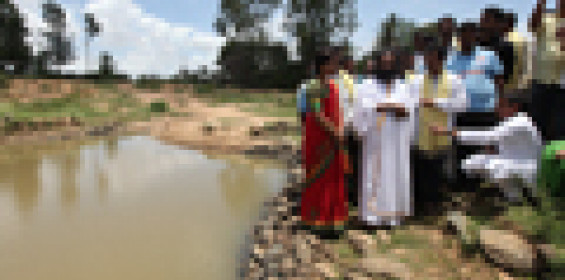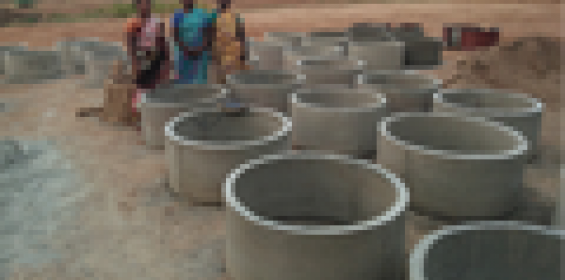Agriculture in Punjab – The tragic story
Friday, the 27th of July, 2018. It is Guru Poornima. Today is also the day Fazilka becomes a new district in Punjab. The paddy fields stretch on either side of the road as far as the eye can see. A multitude of bore-wells spews gushing water, onto the lush green rice plants that are just over a month old. The greenery is so rich and yet, it is this very same lush greenery and these gushing bore-wells, which camouflage the tragic story of what has been happening here; a tragedy that started about 45 years ago.
Memories come flooding back to the year 1976 when I joined the August Brigade of agricultural scientists who ushered the ‘Green Revolution’ in India. We were mentored by the likes of Dr. MS Swaminathan and Dr. MV Rao to create food security in India. As a plant breeder at the prestigious G.B. Pant Agriculture University, I had championed the cause of hybrid seeds. It was our generation of scientists that had encouraged farmers to use chemical fertilizers, pesticides and dig bore-wells. We, in short, heralded the onset of industrial agriculture in India. Little did I realize then, that 42 years later, I would be coming here to try and rectify the wrong, we had unknowingly committed back then.
I am in the midst of conducting the Art of Living, Sri Sri Natural Farming Agriculture Teachers Training Program in Fazilka, Punjab. It is the land of the infamous ‘Bhatinda Express’, euphemistically called the ‘Cancer Express’. Every day, a trainload of cancer patients leaves from Bhatinda to Bikaner in Rajasthan; a trainload of patients whose cancer result is a direct result of the chemicals used in agriculture. The voice of Sukhbinder Singh, one of the many farmers that I interacted with, echoes in my ears. “My wife died of cancer four years ago,'' he shared, without any emotion. Two of his sons succumbed to the disease last year. His was not an isolated story. This disease was compounded by the fact that every bore-well there was spewing water that was flush with toxic heavy metals, including radioactive uranium.
Yes, the green paddy fields looked picture perfect. But the story they bespoke of was one of an enormous tragedy; deployment of a scientific technology that has gone horribly wrong. The deep green of the paddy in the fields was not natural; it was the result of an extensive application of urea. This Urea would boost the plants’ growth, and yet, render them weak and highly susceptible to pests and diseases. This would further unleash extensive spraying of pesticides and fungicides. All these chemicals would spew the spread of cancer in this land. According to several research studies, indiscriminate usage of pesticides in agriculture, and the concentration of uranium in water are considered responsible factors for cancer in this region.
The farmers of Punjab, with the advent of the Green Revolution, most readily adopted the technology of industrial agriculture. They were progressive and wanted to contribute to the Food Security of the Nation. They were given free urea and coerced by the government to adopt industrial agriculture. The farmers in my TTP recall the days when American planes were stationed on their lands to spray pesticides at a highly subsidized price of Rs.18 per acre.
The problem was that, in adopting this technology, they had to completely abandon their traditional methods of farming, which had been practiced sustainably for over 5000 years. This was because these two methods were completely incompatible.
Once the farmers got into chemical farming they could not stop, because the soil demanded more and more agrochemicals to produce the same yields. This led to the debt spiral where increasing input costs and lower returns, forced farmers to use heavier doses of agrochemicals in an attempt to squeeze more yield from the land. This resulted in the soil becoming more and more degraded. The farmers in the course equated this to creating soil addiction for agro-chemicals.
Today we are faced with the twin problems of degraded soils and poisonous food, resulting from indiscriminate use of chemicals and underground water in agriculture.
Farmers in Punjab are desperately looking for alternative methods of sustainable farming. They do not know how to get out of the tenacious grip that chemical farming has them caught in. They are well aware of all the downsides of industrial agriculture but unable to get out of it. Some have tried Organic Farming based on composting and application of Farm Yard Manure (FYM). This technology was doomed from the very beginning and is not suited to our conditions. The sheer cost of Organic Farming is prohibitive and the yields not commensurate with the costs and effort. The normal time for converting chemically farmed land to organic is stipulated by the government as 3 years. Most farmers become disheartened and revert to chemical agriculture long before the end of 3 years.
There is an urgent demand among the farmers of Punjab for a farming technique that is sustainable and chemical-free.
Sri Sri Natural Farming (SSNF) is a sustainable chemical-free technology that is based on very sound scientific principles. SSNF looks at the yield and net profit a farmer makes from the unit area. Using low-cost inputs like bio-fertilizers and bio-pesticides that can be made by the farmers themselves, SSNF promises yields that are equal to or even higher than chemical agriculture. The seeds used are native heirloom varieties that can be saved by the farmers themselves at the end of the season, eliminating the need for costly seed inputs. Multiple cropping techniques result in higher utilization of incident solar energy and maximizes the returns per unit area. Mulching techniques cut water requirements by over 50%. SSNF is a climate-resilient technology that is sustainable.
On the last day of the TTP, my farmers pledged to use the knowledge of SSNF to stop the Cancer Express. It was an emotional session. I realized that these farmers were just waiting for a sustainable alternative to industrial agriculture. The core of SSNF was so simple that it resonated completely with their hearts. I silently thanked Divine Grace for providing me a chance to right a wrong that was unintentionally committed by me 42 years ago.
Dr. Prabhakar Rao is a prominent figure in encouraging chemical-free natural farming methods based on Vedic agricultural techniques. He has a 35 years background in sustainable agriculture and while pursuing his Ph.D. in plant breeding and genetics, he found his passion for preserving endangered plant species.









































































































